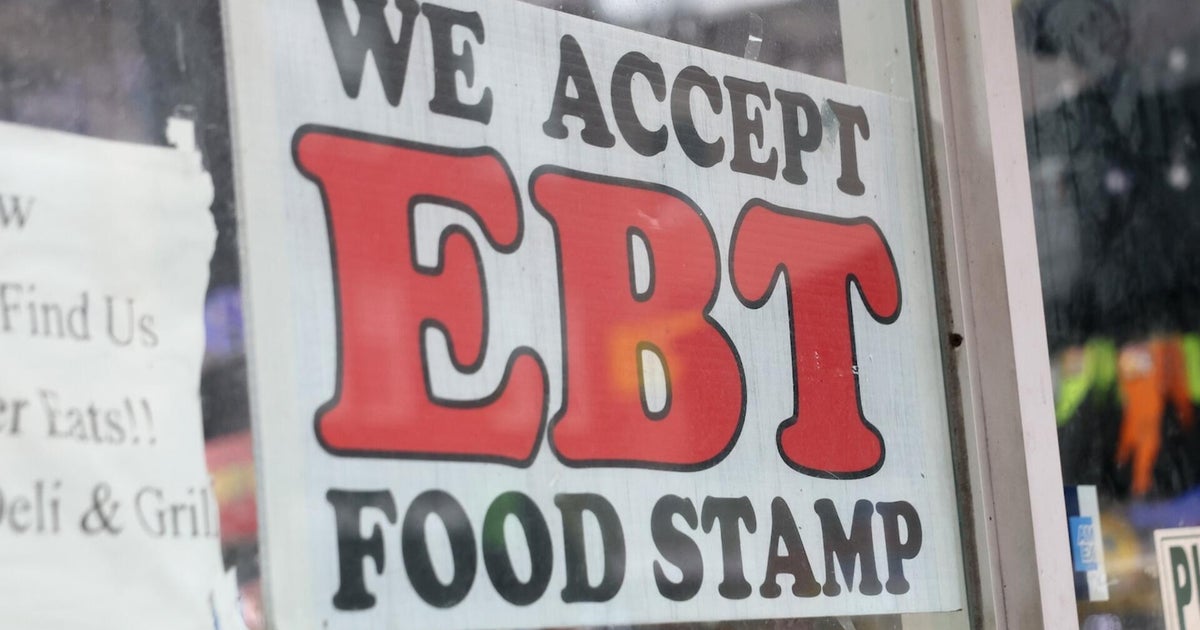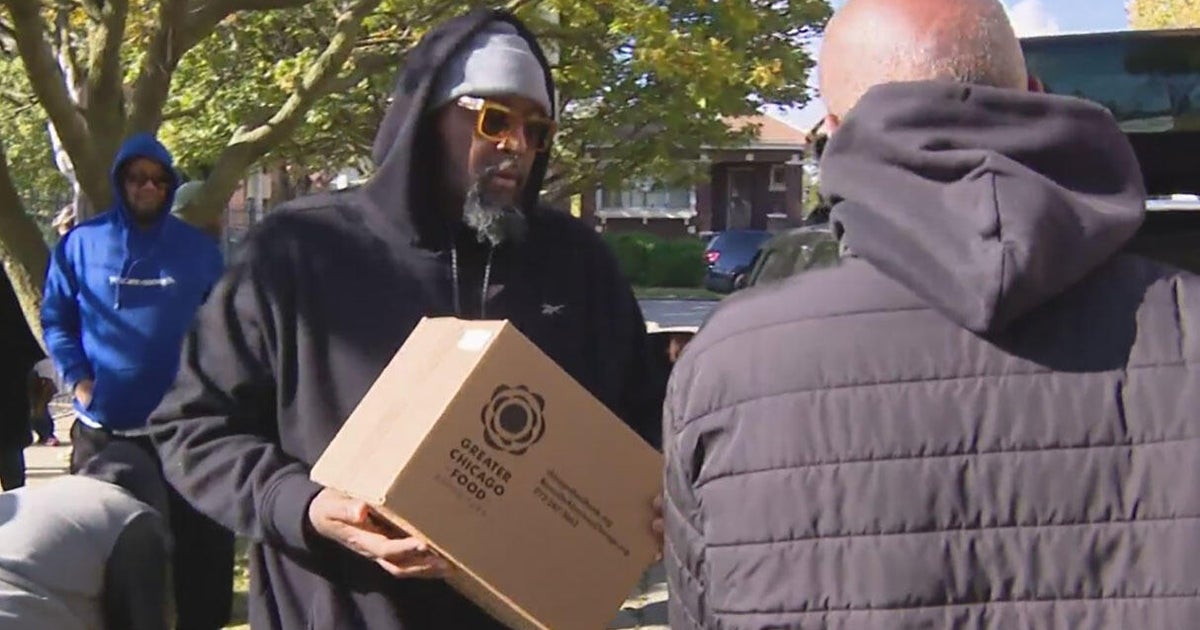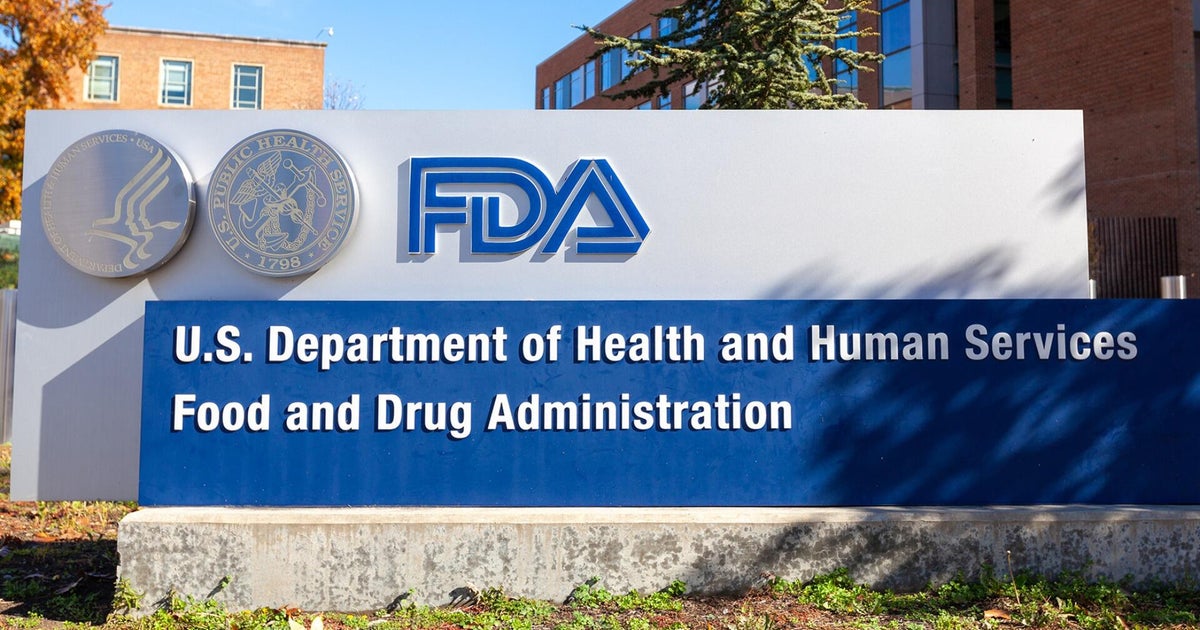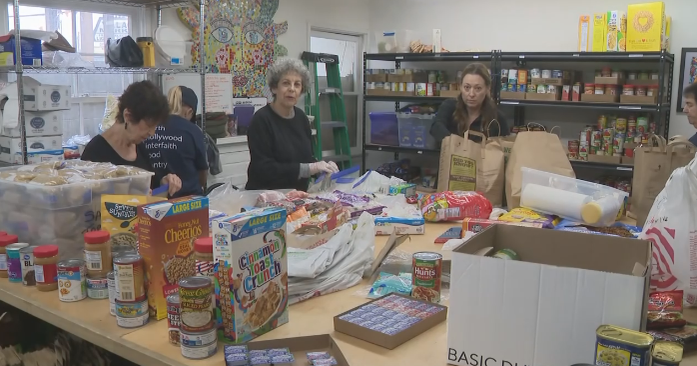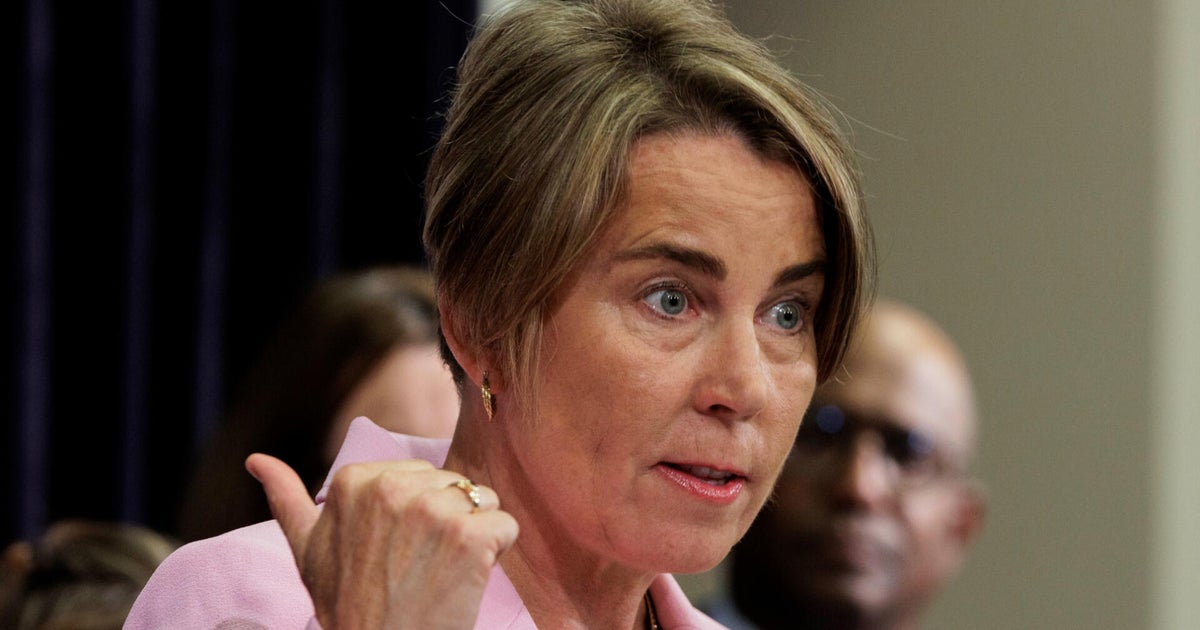Thune says he's "optimistic" about ending government shutdown this week

- Senate Majority Leader John Thune said he's "optimistic" about ending the government shutdown this week, and that the upper chamber would take its 14th vote on a House-passed funding bill on Tuesday.
- "I just think, based on, sort of, my gut of how these things operate, I think we're getting close to an off-ramp here," the South Dakota Republican told reporters at the Capitol.
- The shutdown is set to become the longest on record on Tuesday evening, when it would surpass the record set in 2019.
- Meanwhile, the U.S. Department of Agriculture told a federal court that it will tap into a contingency fund to allow states to issue partial November benefits under the Supplemental Nutrition Assistance Program. Eligible households will receive 50% of their SNAP benefits in November, but the USDA warned that some states might experience delays in getting money out the door.
Speaking to reporters, Thune laid out the next steps toward a potential end to the shutdown.
The House-passed continuing resolution extends government funding at current levels until Nov. 21. Thune said that date will have to change to allow more time for work on year-long appropriations bills. He indicated that doing so would require House lawmakers to return to Washington to reopen the government.
"If we don't start seeing some progress or some evidence of that by at least the middle of this week, it's hard to see how we would finish anything by the end of the week," Thune said. "And I think that would be the objective here, is to try and get something that we could send back to the House that would open up the government."
He added that "the date's going to have to change," referring to the Nov. 21 deadline for funding. "The idea that we could get appropriations bills done by November the 21st now, that date's lost. So it's a question now of what the next date is," he said.
Thune said there are procedural maneuvers for changing the date in the House bill, but doing so would require consent from all senators or at least 60 votes, meaning at least five more Democrats would need to be on board.
"As you look at the calendar, if you want to do normal appropriations work, you look at how long it takes to get bills across the floor in the Senate and through the House, the longer sort of runway there is better. But I'm certainly listening to our colleagues and trying to figure out kind of where the landing spot would be," he said.
Stefan Becket and Alan He
Speaking on the Senate floor, Senate Majority Leader John Thune said the chamber will vote on advancing the House-passed funding bill again on Tuesday, for the 14th time.
"Is this the week that Democrats end their shutdown?" Thune began his remarks by asking. "There are no winners in a government shutdown. There are no winners, but there are plenty of losers."
He continued: "Last week it seemed that Democrats were beginning to acknowledge that their shutdown is having consequences. We even heard Democrats express concerns that Americans were suffering. But when they were given the chance to end all of that suffering, the vast majority of Democrats in this body were perfectly willing to prolong the shutdown and the American people's pain. The vast majority of Democrats voted once again against a clean continuing resolution."
Thune said "it should not be this hard for a handful of Democrats to support a clean bill that simply reopens the government. It's a very straightforward proposition."
"The question, Mr. President, is how long are Democrats going to continue this? Another month? Two? Three? How much suffering is enough for Democrats?" the South Dakota Republican said. "Mr. President, the bill sitting right there, we voted on it 14 times already. We'll get that opportunity to vote on it a 15th time tomorrow, and for the sake of the American people, let's hope that at least some Democrats can see their way to ending this, and ending it soon."
(Thune was apparently including the House vote on the CR in his tally of how many times lawmakers have voted, which House Speaker Mike Johnson also includes. The measure has failed to advance in the Senate 13 times so far.)
Walking to the Senate floor, Thune was asked by a reporter if he was "optimistic of the deal to open the government this week" and whether there had been "progress over the weekend."
"I'm optimistic," Thune said.
"Confident?" the reporter asked.
"Don't push it," Thune replied, laughing.
Returning from the floor, Thune expanded on his thinking.
"I just think, based on, sort of, my gut of how these things operate, I think we're getting close to an off-ramp here, but … this is unlike any other government shutdown, in terms of the way Democrats are reacting to it," he said.
He declined to offer specifics about ongoing talks to resolve the stalemate, but reiterated the offer he has extended to Democrats.
"I think there are a number of things that we have made available to Democrats in terms of the path forward on appropriations, on doing, you know, obviously the minibus that we already have passed in the Senate, and obviously we've indicated in the past that if they want to vote on whatever their Obamacare bill is, a certain date by which they could have that vote," Thune said. "So it's all — these are things that I think, again, I've been saying for some time now. They've got to be willing to take yes for an answer."

The Senate convened at 3 p.m. for speeches ahead of a vote on a judicial nomination at 5:30 p.m.
Senators are not scheduled to vote on the House-passed bill to reopen the government. The bill failed to advance for a 13th time on Oct. 28, the last time it was brought up.
Sen. Amy Klobuchar of Minnesota, the top Democrat on the Senate Committee on Agriculture, criticized the USDA's move to fund for only a portion of SNAP benefits, saying in a statement that it "is not enough to do the bare minimum — they should do everything they can to ensure Americans put food on the table."
"The courts have ordered the administration to use its contingency fund for SNAP — and have made clear it can use its transfer authorities to fully fund SNAP," she said.
Other Democrats shared the sentiment, including Sen. Patty Murray of Washington, the top Democrat on the Senate Appropriations Committee. Murray said in a post on X that the "letter of the law is as plain as day."
"Trump should have paid SNAP benefits all along. Just now paying the bare minimum to partially fund SNAP is not enough, and it is not acceptable," she added. "Trump should immediately work to fully fund benefits under the law."
In his court declaration, Patrick Penn, the official in charge of the USDA's nutrition programs, said the administration would not move money from separate child nutrition accounts to fully cover SNAP benefits for November.
Penn wrote that the USDA "carefully considered" using money appropriated by Congress for child nutrition programs, but determined that doing so would leave the programs with "an unprecedented and significant shortfall."
"Using billions of dollars from Child Nutrition for SNAP would leave an unprecedented gap in Child Nutrition funding that Congress has never had to fill with annual appropriations, and USDA cannot predict what Congress will do under these circumstances," Penn wrote.
The child nutrition programs include funding for school breakfast and lunch programs. The National School Lunch Program alone provides 29 million children with "nutritionally balanced, low-cost or no-cost lunches," Penn said.
In his declaration with the court in Rhode Island, USDA official Patrick Penn said that getting SNAP benefits into the hands of recipients could face delays, since states will have to rework their systems to provide partial payments.
"Given the variation among State systems, some of which are decades old, it is unclear how many States will complete the changes in an automated manner with minimal disruption versus manual overrides or computations that could lead to payment errors and significant delays," Penn wrote.
He added: "For at least some States, USDA's understanding is that the system changes States must implement to provide the reduced benefit amounts will take anywhere from a few weeks to up to several months."
The U.S. Department of Agriculture told a federal court that it will tap into a contingency fund to allow states to issue partial November benefits under the Supplemental Nutrition Assistance Program during the government shutdown.
In a declaration submitted to the U.S. District Court for the District of Rhode Island, Patrick Penn, a Department of Agriculture official who oversees SNAP, said the administration "intends to deplete SNAP contingency funds completely and provide reduced SNAP benefits for November 2025."
Read more here.
The partial government shutdown of late 2018 and early 2019 is the longest in U.S. history. It began on Dec. 22, 2018, and ended on Jan. 25, 2019, its 35th day.
The Senate and the House both passed a continuing resolution to resolve that shutdown by unanimous consent shortly after President Trump announced a deal to extend government funding for three weeks.
The House approved the measure after the Senate, agreeing to it at 6:58 p.m. on Day 35, according to congressional records. The White House announced the president had signed the continuing resolution at 9:23 p.m.
Without an unforeseen breakthrough in the Senate, the current shutdown will match the 35-day mark on Tuesday, making it the longest ever by tomorrow evening.
Asked to weigh in on the president's calls to end the filibuster in recent days, Johnson said he talked to the president multiple times over the weekend and the topic came up. He said Mr. Trump is "very passionate about this," while attributing the energy around the issue within the GOP to "the real desperation that we feel because we want the government to be open."
"I understand desperate times call for desperate measures," Johnson said. "I also understand that traditionally we've seen that as an important safeguard, I mean, I obviously shared my thoughts with the president on that."
The Louisiana Republicans said "as much as I have wanted to blow up the filibuster sometimes as a House member, when we were not getting what we wanted done on our agenda, I hear my Senate Republican colleagues, some of the most conservative people in Congress, who say it's an important safeguard."
Democrats have "already told us" what they would do without the filibuster in place, Johnson said, arguing they would pack the Supreme Court, grant statehood to D.C. and Puerto Rico, restrict Second Amendment rights and federalize elections.
Johnson said there are "a lot of abuses that could come, and so that's the caveat, that's what they're working through."
The speaker acknowledged that it's "not a House issue, it's a Senate issue, and we'll see how that's resolved."
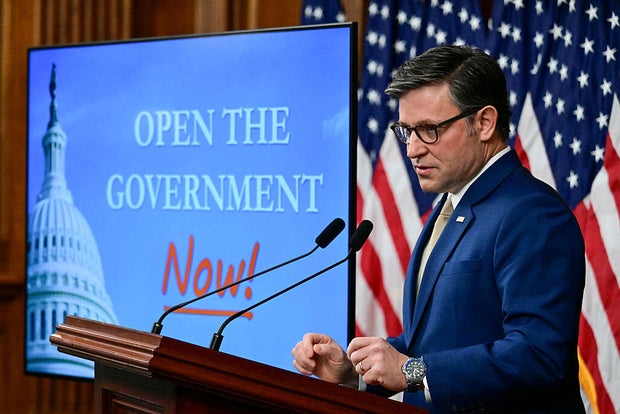
At his press conference at the Capitol, House Speaker Mike Johnson defended the administration's stance on funding SNAP benefits, arguing there are "legal impediments" to using a contingency fund for the food aid.
The Louisiana Republicans said "the president is desperate for SNAP benefits to flow to the American citizens who desperately rely upon it." But he said it's "more complicated" than simply funding the benefits with the contingency funds, which he said are intended for things like hurricanes.
"The way we always understood it was, the contingency fund could not be used legally if the underlying fund were suspended," Johnson added. "You have two courts, two liberal courts, Obama judges who've said, no, that's not right, get them paid. Well, it's more complicated than that."
He said that the $5.2 billion in the contingency fund wouldn't fully cover the $9 billion needed to pay full benefits for November, requiring the government to calculate partial benefits: "It's not as easy as hitting, go, send, on a computer. You've got to go through and recalculate partial payments to the 42 million recipients on the program."
The speaker noted that Mr. Trump isn't appealing the ruling from two federal judges last week, who directed the administration to tap into contingency funds to make the payments. He said Mr. Trump "wants SNAP to be done, but he doesn't see the mechanism to do it."
Johnson reiterated that "the easiest way to get full SNAP payments to everybody who's eligible is for the Democrats to come in here and vote to reopen the government on a clean, non-partisan CR."
The Senate is not currently scheduled to vote on the House-passed measure to reopen the government today.
The Senate convenes at 3 p.m. with a procedural vote on a judicial nomination set for 5:30 p.m., according to Majority Whip John Barrasso's office.
Some senators have forecasted a possible end to the shutdown this week, pointing to new opportunities for each side to relent.
Republicans have argued that Democrats may be willing to reopen the government after Tuesday's elections. Meanwhile, Democrats say Republicans will face pressure to negotiate on their health care demands due to the rising health insurance premiums. New prices are visible after open enrollment on the Affordable Care Act marketplace began over the weekend.
A planned recess in the Senate next week is added incentive for senators to resolve the standoff. And lawmakers say the president's return to Washington also increases the likelihood of a resolution, since the White House would likely be involved in any talks to reach an agreement.
The Trump administration faces a noon deadline to respond after two federal judges said it must tap into contingency funds to make payments for food stamps under the Supplemental Nutrition Assistance Program, or SNAP, in recent days.
Roughly 42 million Americans rely on the SNAP benefits, which faced a funding shortfall on Saturday amid the shutdown.
U.S. District Judge John McConnell in Rhode Island ordered the Trump administration to pay the food aid in full by Monday and to report to the court by noon regarding the status of the distribution.
Mr. Trump said in a Truth Social post on Friday that he was asking for clarification from the court on funding SNAP during the shutdown. He said if the court provides appropriate legal direction, "it will BE MY HONOR to provide the funding, just like I did with Military and Law Enforcement Pay."
In an interview that aired Sunday on "60 Minutes," President Trump placed the blame for the ongoing government shutdown on Democrats and said his plan to end the standoff is to "keep voting."
"The Republicans are voting almost unanimously to end it, and the Democrats keep voting against ending it," Mr. Trump said. "You know, they've never had this. This has happened like 18 times before. The Democrats always voted for an extension, always saying, 'Give us an extension, we'll work it out.'"
He said Democrats have become "crazed lunatics" who have "lost their way."
Democrats are seeking an extension to expiring Affordable Care Act tax credits as a condition for their support to reopen the government.
Read more here and watch more of Norah O'Donnell's interview here.
Transportation Secretary Sean Duffy said Sunday that airport delays are "going to get worse" as the government shutdown drags on and air traffic controllers go unpaid.
"I think the real consequence is, what kind of rolling delays do you have throughout the system, right?" Duffy said on "Face the Nation with Margaret Brennan." "We've seen problems at L.A., in Dallas, in D.C., Boston, Atlanta. And so I think it's only going to get worse."
Read more here.
President Trump late Sunday called again for the Senate to do away with the filibuster, the 60-vote threshold needed to advance most legislation. The comments come after he urged Republicans late last week to take "the Nuclear Option" to reopen the government without Democratic votes.
"TERMINATE THE FILIBUSTER, NOT JUST FOR THE SHUTDOWN, BUT FOR EVERYTHING ELSE," Mr. Trump said in a post on Truth Social.
The calls from the president come as some on the party's right flank, like Rep. Marjorie Taylor Greene of Georgia, have likewise urged Senate Republicans to change the upper chamber's rules to end the shutdown. But Senate Majority Leader John Thune favors preserving the filibuster, and a spokesperson said Friday that his position remains unchanged.
The president responded to Thune's position in an interview that aired on "60 Minutes" on Sunday, saying "I like John Thune. I think he's terrific, but I disagree with him on this point."
"The Republicans have to get tougher," the president said. "If we end the filibuster, we can do exactly what we want."
In the president's latest call to end the filibuster, he suggested that the move would benefit Republicans more broadly, saying "WE WILL GET ALL OF OUR COMMON SENSE POLICIES APPROVED (VOTER ID, ANYONE?) AND MAKE AMERICA GREAT AGAIN!" Mr. Trump also suggested that Democrats would take their first opportunity to do away with the filibuster.
"REMEMBER, THE DEMOCRATS WILL DO IT IMMEDIATELY, AS SOON AS THEY GET THE CHANCE," Mr. Trump said. "OUR DOING IT WILL NOT GIVE THEM THE CHANCE. REPUBLICANS, BE TOUGH AND SMART!"
Cbs News



